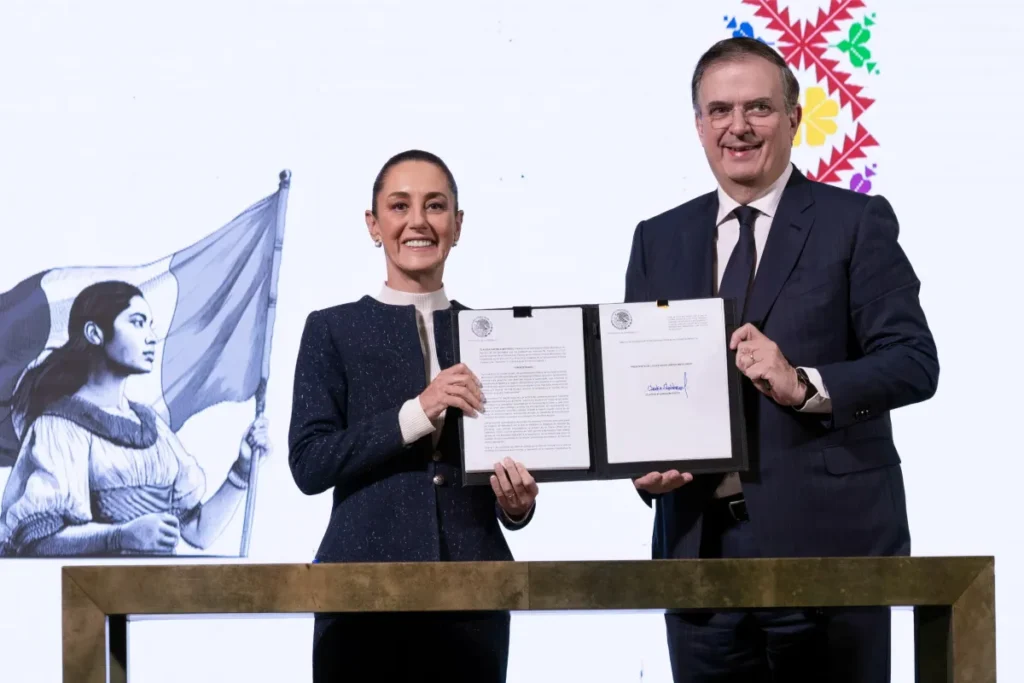Last Updated on February 6, 2025

Mexico’s textile industry, a cornerstone of the nation's economy, employs approximately 400,000 individuals and significantly contributes to the country's GDP. Recognizing the challenges posed by global competition and imported goods, President Claudia Sheinbaum has enacted decisive measures to protect and strengthen this vital sector.
Introduction of Elevated Tariffs on Textile Imports
On December 19, 2024, President Sheinbaum signed a decree implementing substantial tariffs on textile imports. Finished textile products now face a 35% import tariff, while textile merchandise imports are subject to a 15% tariff. These measures are designed to provide a competitive edge to Mexican manufacturers and safeguard jobs in the country’s textile sector.
The announcement of the new tariffs comes as Mexico seeks to reduce its reliance on imports from China and other Asian countries and bolster domestic production. Mexico’s trade and investment relationship with China has been questioned and/or criticized in both the United States and Canada, and could be a point of contention at the review of the USMCA trade pact in 2026. - Mexico News Daily
Reformation of the IMMEX Program
In conjunction with the increased tariffs, the decree introduces stringent regulations under the Manufacturing, Maquiladora, and Export Services (IMMEX) program. The IMMEX program, which allows foreign manufacturers to temporarily import goods into Mexico for assembly and export without incurring certain taxes, has promoted manufacturing within the country. However, the proposed reforms aim to tighten compliance and ensure that the program benefits are not misused, thereby fostering fair competition and bolstering domestic production.
Companies that use inputs now listed in Annex I of the IMMEX must import the goods under the definitive regime, or else find new suppliers, preferably from countries with Free Trade Agreements.
Broader Economic Implications
These initiatives are part of a comprehensive strategy to strengthen Mexico's industrial base. By imposing higher tariffs and reforming import programs, the government seeks to:
- Encourage Domestic Production: By making imported textiles less financially attractive, especially from China, local manufacturers are better positioned to capture market share.
- Stimulate Innovation and Investment: The protective measures provide a more secure environment for businesses to invest in advancing technologies and innovative processes.
- Preserve Employment: Safeguarding the textile industry helps maintain jobs and supports hundreds of thousands of Mexican families.
Anticipated Impact on the Textile Sector
The reforms are expected to reshape Mexico’s textile industry by:
- Promoting Modernization: Encouraging advanced manufacturing techniques to enhance productivity and quality.
- Attracting Investment: Creating a favorable environment for domestic and foreign investors to fund textile operations in Mexico.
- Enhancing Global Competitiveness: Positioning Mexican textiles as high-quality products on the international market.
Conclusion
President Sheinbaum's decisive actions underscore the government's commitment to textile industry sustainability and growth. By implementing higher tariffs and reforming the IMMEX program, Mexico aims to create a more equitable and prosperous economic landscape. These measures not only protect existing jobs but also lay the groundwork for future advancements. This ensures that the Mexican textile industry remains a vital and competitive player on the global stage.
About NovaLink
As a manufacturer in Mexico, NovaLink employs a unique approach that transcends the traditional model of shelter production. More than just the location of your manufacturing, we would like to become a partner in your manufacturing in Mexico. You will be able to relocate or initiate manufacturing for your company in Mexico in a low-cost labor environment with very little delay or up-front costs. Find out how we can help you by handling the manufacturing process.
There are NovaLink facilities in the border cities of Brownsville, Texas, Matamoros, Mexico, and Saltillo, Mexico.